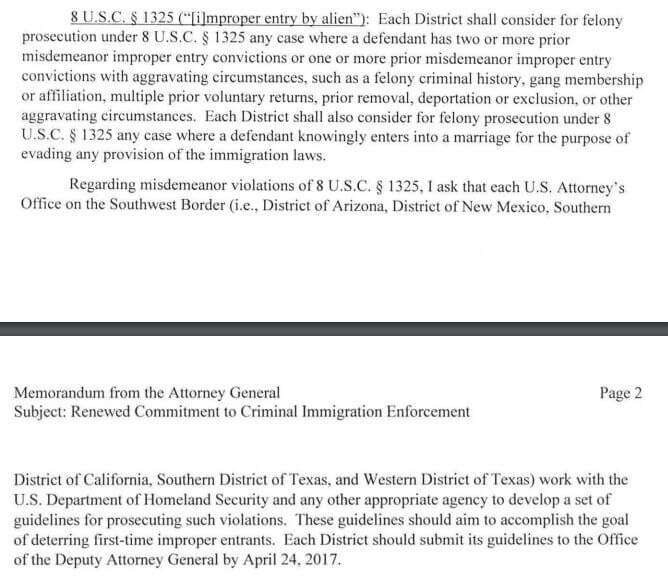- Introduction
- Relevant Statute
- The Sessions Memorandum
- Analysis of the New Policy
- Conclusion: What the Policy Means
Introduction
On April 6, 2018, Attorney General Jeff Sessions issued a memorandum for federal prosecutors on the Southwest Border titled “Zero-Tolerance for Offenses Under 8 U.S.C. 1325(a)” [PDF version]. In the memorandum, Attorney General Sessions directs Federal prosecutors on the Southwest Border to prosecute every case referred by the Department of Homeland Security (DHS) under 8 U.S.C. 1325(a) (same as section 275(a) of the Immigration and Nationality Act (INA)) to the extent practicable. Here, it is important to note that section 275(a) of the INA is a criminal law instead of a civil immigration law. This means that charges under section 275(a) are prosecuted in criminal court instead of civil immigration court.
In this article, we will examine the relevant statute, the Sessions memorandum, and what this new policy may mean going forward.
Relevant Statute
Before examining the Sessions memorandum, it is important to understand the criminal statute that it discusses: section 275(a) of the INA (codified at 8 U.S.C. 1325(a)).
Section 275(a) is a criminal provision titled “Improper time or place; avoidance of examination or inspection; misrepresentation and concealment of facts.”
It criminalizes the following actions by any alien who:
1. enters or attempts to enter the United States at any time or place other than as designated by immigration officers, or
2. eludes examination or inspection by immigration officers, or
3. attempts to enter or obtains entry to the United States by willfully false or misleading representation or the willful concealment of a material fact…
Section 275(a)(3) provides the following penalties for any of the above offenses: “[F]or the first commission of any such offense, [the alien shall] be fined under title 18 or imprisoned not more than 6 months, or both, and, for a subsequent commission of any such offense, [the alien shall] be fined under title 18, or imprisoned not more than 2 years, or both” (emphasis added).
Potential civil fines for improper entry or attempted improper entry are set forth in section 275(b) (codified at 18 U.S.C. 1325(b)) of the INA. An alien will be fined “at least $50 and not more than $250 for each [improper] entry (or attempted entry)” if he or she has not been previously convicted under section 275(a). The alien shall be fined at least $100 and not more than $500 for each improper entry or attempted entry if he or she has been previously subject to a civil penalty under section 275(b). The statute makes clear that these civil fines are imposed “in addition to, and not in lieu of, any criminal or other civil penalties that may be imposed.”
All of the proscribed actions in section 275(a) are also prohibited under the civil immigration laws. That is, an alien who enters the United States without inspection or who seeks to enter or enters the United States through willful misrepresentation or concealment of a material fact may be subject to inadmissibility and/or deportability under the INA.
The Sessions Memorandum
Sessions begins by referencing a memorandum that he issued on April 11, 2017, titled “Renewed Commitment to Criminal Immigration Enforcement” [PDF version]. That memorandum was issued to all Federal prosecutors. In it, he directed the following with regard to enforcement of section 275(a):

In the instant 2018 memorandum, Attorney General Sessions explains that he had, in the April 11, 2017 memorandum, “directed each United States Attorney’s Office along the Southwest Border to work with the Department of Homeland Security to develop guidelines for prosecuting offenses under 8 U.S.C. 1325(a).”
In the instant 2018 memorandum, Sessions directs “each United States Attorney’s Office along the Southwest Border-to the extent practicable, and in consultation with DHS-to adopt immediately a zero-tolerance policy for all offenses referred for prosecution under section 1325(a).” Sessions further directs that this new zero-tolerance policy for offenses under section 275(a) of the INA “shall supersede any existing policies.” Furthermore, he orders U.S. Attorneys to identify and request any additional resources that are necessary to implement the new zero-tolerance policy.
In a DOJ press release on the memorandum, the DOJ states that the “zero-tolerance policy … directs each U.S. Attorney’s Office along the Southwest Border (i.e., Southern District of California, District of Arizona, District of New Mexico, Western District of Texas, and the Southern District of Texas) to adopt a policy to prosecute all Department of Homeland Security referrals of section 1325(a) violations, to the extent practicable)” [PDF version].
Attorney General Sessions has implemented the new policy due in part to “[t]he recent increase in aliens illegally crossing our Southwest Border…” He states that, in the past, “prosecution initiatives in certain districts … led to a decrease in illegal activities in those districts.”
Analysis of the New Policy
In general, the U.S. Customs and Border Protection (CBP) — a component of the DHS — is responsible for border security and for making arrests along the Southwest Border. The DHS may make criminal referrals of aliens it arrests along the Southwest Border to the DOJ. In the alternative, the DHS may opt to pursue only civil immigration charges against aliens described by section 275(a). Under the new Sessions memorandum, U.S. Attorneys along the Southwest Border are instructed to prosecute all referrals from the DHS for prosecution under section 275(a).
However, it is worth noting that Attorney General Sessions adds the wording “to the extent practicable” to the directive. To this effect, it is important to note that, like the DHS, the DOJ only has finite resources, and handling immigration prosecutions is only one part of what it does. Thus, it remains unclear whether the DOJ will have the resources to implement the zero-tolerance policy to the maximum extent. Questions about resources are why Sessions has directed the U.S. Attorney’s offices along the Southwest Border to specify and request which resources are needed — if any — to implement the policy.
Another critical question regarding the implementation of the memorandum is to what extent the DHS will elect to refer more cases for prosecution under section 275(a). The DHS, as a separate and distinct Federal agency, is not bound by the directives of the Attorney General. It is for this reason that Sessions has directed U.S. Attorneys on the Southwest Border to work with the DHS in crafting a new policy. However, there are two primary reasons to believe that the DHS will provide robust cooperation in implementing the new policy.
Firstly, both agencies act upon delegated authority from the President. To this effect, President Donald Trump directed the Attorney General to “take all appropriate steps to establish prosecution guidelines and allocate appropriate resources to ensure that Federal prosecutors accord a high priority to prosecutions of offenses having a nexus to the southern border” in his January 25, 2017, Executive Order 13767, titled “Border Security and Immigration Enforcement Improvements” [PDF version]. Although that directive applies specifically to the DOJ, it designates the prosecution of offenses “having a nexus to the southern border” as a priority for the administration. Furthermore, in the implementing DHS memorandum for the Executive Order 13767, former Secretary of Homeland Security John Kelly directed the DHS to prioritize the prosecutions of criminal offenses committed at the border [see article].
Secondly, the DHS has already made it a priority to curtail the number of illegal border crossings, especially in light of the gradual increase throughout the Trump Administration from the record low numbers in early 2017. In an April 5, 2018, DHS statement on the high numbers seen in March 2017, the Department stated: “We need to close … dangerous loopholes that are being taken advantage of each and every day, gain operational control of the border, and fully fund the border wall system. As the President has repeatedly said, all options are “on the table” [PDF version].
Conclusion: What the Policy Means
Although it is impossible to say the extent to which the “zero-tolerance” policy will be implemented, it is safe to say that the DOJ will seek to increase the use of criminal prosecutions for border-related immigration offenses described in section 275(a). This new policy comes in addition to the policies for increasing the use of DOJ resources for prosecuting certain other immigration-related criminal offenses included in the April 11, 2017 memorandum.
An alien who faces criminal charges under section 275(a) will need to obtain criminal representation for proceedings in Federal district court. Representing a client in Federal district court in criminal proceedings is distinct from representing a client in a civil immigration matter before an administrative court or a Federal district or circuit court. An alien facing misdemeanor or felony criminal and/or civil charges relating to immigration offenses should consult with an experienced immigration attorney for an overall consultation on his or her immigration situation and for guidance on whether he or she may need separate representation for criminal proceedings. It is worth noting that, generally, the elements of an offense listed in section 275(a) of the INA are all covered by provisions of the INA providing for civil immigration penalties that would subject an alien to removal from the United States.
We will update the website with more information about the new policy and its implementation as it becomes available.
Please see our related article on the decision to request National Guard troops to secure the border for more information about recent border security initiatives from the White House [see blog].





